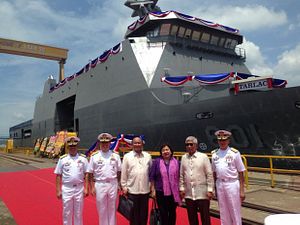Over the weekend, the head of Indonesia’s state-owned shipbuilder PT PAL said that the firm had received several more orders to build vessels from countries from Southeast Asia to Africa following an initial success in the Philippines. His remarks on the growing attractiveness of the country’s shipbuilding industry reflect Indonesia’s desire to advance in this area despite the familiar difficulties it has faced thus far and the realities it confronts.
As I have noted previously, Indonesian President Joko “Jokowi” Widodo has signaled his desire to boost the country’s domestic shipbuilding industry as part of a broader effort to strengthen the country’s maritime capabilities as well as to revolutionize its domestic defense industry (See: “An Indonesian Defense Revolution Under Jokowi?”).
Seen from this perspective, PT PAL’s $92 million contract to deliver two Strategic Sealift Vessels (SSVs) to the Philippines inked back in 2014 was seen as significant because it constituted the inaugural export of locally-built warships and thus a major boost to Indonesia’s efforts to build up its domestic shipbuilding industry (See: “Indonesia to Export First Ever Warship in Boost for Shipbuilding Industry”).
Though the deal was rocked by a corruption scandal earlier this year, the two vessels were delivered in May 2016 and May 2017 respectively.
As those orders neared completion, Indonesian officials had been signaling that more orders would be on the way. But most of the public remarks tended to be on the Philippines itself, with two more Strategic Sealift Vessels (SSVs) on order as well as other vessels as well.
On July 15, PT PAL president director Budiman Saleh reportedly publicly disclosed that the list of orders so far had not only come from the Philippines, but that the orders had served as “a magnet for other countries” to order them as well.
Saleh’s suggestion was that Indonesia was becoming a more attractive and competitive choice for nations around the world. And he is not alone in making this point – we have seen several such comments emerging from Indonesian officials since Jokowi took office.
But this time around, Saleh did offer some more specifics. According to The Jakarta Post, Saleh specifically said that Malaysia had ordered a Landing Platform Dock (LPD) that could transport up to five helicopters; Nigeria had ordered one SSV; Senegal had ordered one LPD ship along with two Clurit class fast attack craft KCR-35 meter ships and three KCR-60 meter ships; and Guyana Bissau and Gabon had ordered KCR-60 meter ships.
Despite Saleh’s optimism, some would quibble as to whether a few orders can really be read to constitute some sort of “magnetic attraction” stemming from the first contract in the Philippines. It is also still far from clear what the exact status of these orders are and how they will play out.
But more fundamentally, the attention to specific orders downplays the broader issues that still exist with Indonesia’s domestic shipbuilding industry as well as PT PAL itself. The challenges for Indonesia’s shipbuilding industry are well-known to regional observers, and they range from the comparatively low level of expertise and technology to corruption to low production capacity. This is despite some attempts at improvements, including inking agreements with other countries and companies to increase levels of expertise and boost defense ties more generally that could also yield separate future gains.
Indeed, in a ceremony last May to commemorate the historic export of the first vessel to the Philippines, Indonesian Vice-President Jusuf Kalla himself had implored the country to seize the opportunities in the global shipbuilding industry but also noted the series of steps that would be needed to actually realize this, including developing adequate skilled manpower, improving production quality and delivery times, and lowering prices.
Saleh himself seemed to allude to some of this with respect to PT PAL specifically, noting that it needed the government’s support and that the company’s shipyard is still far from capacity, with workload in April being just 15 percent of total capacity. Even he no doubt understands that if Indonesia intends to become the shipbuilding magnet it aspires to be, it will need to do a whole lot more to make it more of an attraction to the world at large rather than just playing up existing ship orders.
































